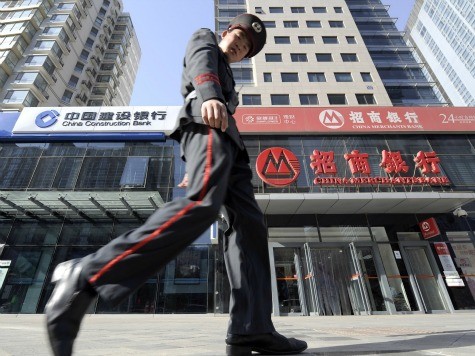
Confirming the thesis expressed in American Thinker on October 21st regarding the growing uncompetitiveness of Chinese manufacturing, “Why China Wants to Dump the Dollar“, two days later Bloomberg.com reported “China’s biggest banks tripled the amount of bad loans written off in the first half, cleaning up their books ahead of what may be a fresh wave of defaults.”
Despite the common belief among economists and most Americans that the booming Chinese economy of the last ten years was a “miracle”, it is now apparent that the secret sauce for China’s success was allowing a massive expansion of bad loans to subsidize Chinese employment in manufacturing.
The Chinese banking sector has always been dominated by four large state-owned banks (SOBs) that account for more than 75% of both business loans and household deposits. Leading up to the Soviet Union’s collapse and the implosion of the communist nation’s trade agreements in the early 1990s, China’s SOBs increased their lending from 50% to 120% of the nation’s Gross Domestic Product (GDP) to create jobs for China’s huge peasant population.
After 1999, over 40% of these state-owned bank loans to state-owned enterprises were written off as uncollectable. To give some perspective on the damage Chinese banks suffered, losses by U.S. banks from sub-prime lending was approximately $250 billion. If American banks’ losses were equivalent to the damage inflicted on Chinese banks, the U.S. losses would have been $7.7 trillion, or thirty times greater.
In the first acknowledgement of a new banking crisis, Industrial & Commercial Bank of China Ltd. (who has been touted as the world’s most profitable lender) just announced its loan losses have tripled in the last six months to 22.1 billion yuan, or $3.65 billion, up from 7.65 billion yuan a year earlier.
China is notorious for presenting pleasant financial reports. Consequently, admitting nonperforming-loans means that business defaults in the world’s second-largest economy are booming following the unprecedented credit boom that began in 2009. “The banks and the regulators’ interests are aligned in speeding up write-offs,” said Ma Kunpeng, a Beijing-based analyst at Credit Suisse Founder Securities Ltd. “This prepares them for a rainy day.” These are code words for tsunami alarm bells going off.
The China Banking Regulatory Commission, led by Shang Fulin, urged banks in April to set aside more funds to cover defaults, write off some bad loans, and curb dividend payments while earnings are ample to create a buffer in case of an economic downturn.
At the end of September, analysts cheered as the Chinese government announced growth had rebounded to 7.8% percent in the period from July through September. But unreported has been that China’s bank debt-to-GDP ratio has more than doubled in the last six years to 207% of the economy. This key measure is still less than in the U.S., but most Chinese loans are to government operated companies creating jobs, not profits.
The four biggest lenders in China by the end of June reported that they had set aside an average of 272% of the “value” of their troubled loans, a provision that surpassed the Chinese banks regulator’s requirement of 150% in reserves to cover bad debts. But as those bad debts have tripled, the reserves are less than a speculative 100% coverage.
China’s courts have started to process bankruptcies faster in the eastern province of Zhejiang, a region south of Shanghai that’s home to many of the country’s largest private companies. The courts accepted 143 bankruptcy petitions last year, almost twice the number from a year earlier. When the Bank of Communications, the nation’s fifth-largest lender, was asked about why its’ bad loan write-offs surged sevenfold, a press officer for the Shanghai-based lender, known as BoCom, declined to comment.
For U.S. banks, when borrowers starts facing difficulties with repayments and the loan is “classified” as nonperforming, the bank sets aside funds in case the debt becomes unrecoverable. The practice of writing off loans has been uncommon in China, where banks need to get approval from the Finance Ministry to remove debt from their books. In most cases, a court also has to declare the borrower bankrupt before the lender can seek that permission.
This crony relationship between the government, the banks, and the courts has allowed Chinese banks to report that they are the most profitable banks on earth. But all this assumes that state-owned enterprises can continue to lose money and the Chinese government has the capacity to rescue them. This is subject to Margret Thatcher’s warning: “The problem with socialism is that you eventually run out of other people’s money.”

COMMENTS
Please let us know if you're having issues with commenting.